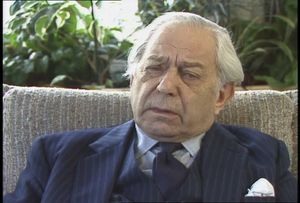Interview with Roger Sherfield, 1986 [1]
Item Information
- Title:
- Interview with Roger Sherfield, 1986 [1]
- Description:
-
Sir Roger Makins, later Lord Sherfield, was the British ambassador to the United States from 1953 to 1956 and chairman of the United Kingdom Atomic Energy Authority from 1970 to 1992. In the interview he conducted for War and Peace in the Nuclear Age, Sherfield summarizes Anglo-American relations from the end of World War II through the 1958 amendment to 1946s McMahon Act, which had banned the transfer of scientific and technological information necessary to manufacture an atomic bomb. He begins by discussing Britains collaboration with the United States to develop the first atomic bomb, underlining Britains crucial contribution to the endeavor. The subsequent passage of the McMahon Act deeply shocked Britain and abruptly halted the partnership as well as the wartime agreements, about which Congress knew almost nothing. Sherfield remembers that the discovery of Klaus Fuchs, one of the most infamous Cold War spies, deepened Senate hostilities to restoring ties with Britain. Slowly the atmosphere shifted. Sherfield recounts European outcry at the news that U.S. president Harry S. Truman was considering using the atomic bomb against the Chinese in the Korean conflict. His trip to Washington with British prime minister Clement Atlee the following week succeeded in calming worldwide fears and defusing the crisis. Britain developed its own atomic-weapons program and U.S. president Dwight D. Eisenhower launched an initiative to turn atoms for war into atoms for peace. Sherfield recounts the ten years of almost continuous negotiation before bilateral exchange of nuclear-weapons technologies resumed. He also describes the foreign-policy balance that the UK sought: both a significant U.S. presence in Europe and a British voice in any nuclear-use decision that an American president might exercise.
- Interviewee:
- Sherfield, Roger Mellor Makins, Baron, 1904-
- Date:
-
November 13, 1986
- Format:
-
Film/Video
- Location:
- WGBH
- Collection (local):
-
WGBH Open Vault
- Series:
- War and Peace in the Nuclear Age
- Subjects:
-
Joliot-Curie, Frederic
Great Britain
Nuclear weapons
Korean War, 1950-1953
Soviet Union
Atoms for Peace (U.S.)
Espionage
International relations
Rickover, Hyman George
Nuclear arms control
Fuchs, Klaus Emil Julius, 1911-1988
Truman, Harry S., 1884-1972
Acheson, Dean, 1893-1971
Cockcroft, John, Sir, 1897-1967
Eisenhower, Dwight D. (Dwight David), 1890-1969
Attlee, C. R. (Clement Richard), 1883-1967
Tizard, Henry Thomas, 1885-1959
- Places:
-
England
United States
China
Canada
- Extent:
- 00:42:05:12
- Link to Item:
- https://openvault.wgbh.org/catalog/V_915B4A94499B4E65A8085B30AD534E5E
- Terms of Use:
-
Rights status not evaluated.
Contact host institution for more information.
- Publisher:
-
WGBH Educational Foundation
- Identifier:
-
V_915B4A94499B4E65A8085B30AD534E5E
![Interview with Roger Sherfield, 1986 [1]](https://bpldcassets.blob.core.windows.net/derivatives/metadata/commonwealth-oai:7d27br510/image_thumbnail_300.jpg)
![War and Peace in the Nuclear Age; Interview with Roger Sherfield, 1986 [1]](https://bpldcassets.blob.core.windows.net/derivatives/metadata/commonwealth-oai:4q77k526c/image_thumbnail_300.jpg)


![Interview with Roger Sherfield, 1986 [3]](https://bpldcassets.blob.core.windows.net/derivatives/metadata/commonwealth-oai:tb09m435s/image_thumbnail_300.jpg)